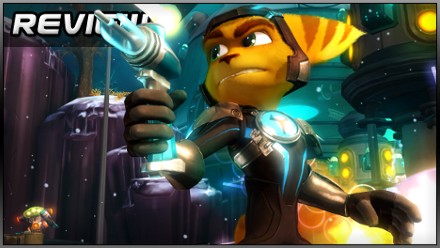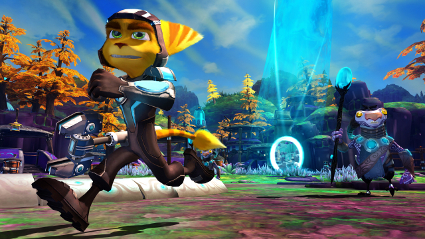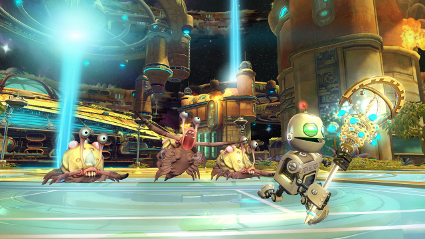There comes a point in a developer’s career when you know they’re going to carry on producing decent games till electronics go out of fashion. Insomniac isn’t quite the platinum brand Bungie or Valve is, but the California-based independent has seldom put a foot wrong, quietly washing its hands of Spyro the Dragon before the series nose-dived into mediocrity, and treating PS3 owners to an uneasy but enjoyable marriage of realism and ridiculousness in the form of the Resistance shooters.
The Ratchet and Clank franchise is the studio’s longest-running success story, with nine releases (including the High Impact spin-offs), seven years and over 10 million sales under its belt. In the course of that lifespan high definition graphics have flourished, digital distribution has cast its shadow over brick-and-mortar retail and online functionality has become the norm, yet somehow this lean, lovable action-platformer is the same as it ever was, toying with new possibilities but subordinating them firmly to the age-old thrill of smashing stuff with a novelty wrench.
So it is that Crack in Time, despite its up-to-date prettiness, is still a game about powderising huge chunky piles of shiny objects in order to hoover up still more shiny objects, thus upgrading your (equally chunky and shiny) means of destruction and enabling the delicate process to repeat. It’s a shamelessly tawdry experience, harkening back to an era before gaming knew what it was to be “respectable”, before the cool rounded blues of social networking sites and the sterilised family-friendliness of Mii avatars – back to Spyro’s gemstones and Crash Bandicoot’s crates.
Insomniac has served up some counterspin this time, admittedly: as Ratchet, you’ll break things for Bolts (the series’ plentiful universal currency), but as Clank you can also do so by repairing them. The diminutive ‘bot begins the game in the clutches of gesticulating, would-be universe overlord Dr Nefarious, imprisoned aboard a facility at the universe’s centre called The Great Clock. Clank eventually gets hold of a staff which enables him to reverse time, restoring objects to usefulness. It’s a sly bit of reciprocity – Ratchet trashing the galaxy in search of his friend (alternately aided and hindered by the hilarious Captain Quark), while Clank patches things up at the cosmic timepiece.
Time manipulation also underpins the more severe of the game’s puzzles. In certain areas, Clank can create little “recordings” of himself performing certain sequences of actions to make up for Ratchet’s absence. Simpler scenarios might involve using one temporally displaced copy to weigh down a floor switch while another scuttles through; later on, you’ll have to synchronise the movements of three or four playbacks. Nothing tremendously original, but a nice change from the hover-races and arena battles which comprise Crack in Time’s other, more routine diversions.








 Satoru Iwata Video Interview - the late Nintendo president spoke with Kikizo in 2004 as 'Nintendo Revolution' loomed.
Satoru Iwata Video Interview - the late Nintendo president spoke with Kikizo in 2004 as 'Nintendo Revolution' loomed. Kaz Hirai Video Interview - the first of Kikizo's interviews with the man who went on to become global head of Sony.
Kaz Hirai Video Interview - the first of Kikizo's interviews with the man who went on to become global head of Sony. Ed Fries Video Interview - one of Xbox's founders discusses an epic journey from Excel to Xbox.
Ed Fries Video Interview - one of Xbox's founders discusses an epic journey from Excel to Xbox. Yu Suzuki, the Kikizo Interview - we spend time with one of gaming's most revered creators.
Yu Suzuki, the Kikizo Interview - we spend time with one of gaming's most revered creators. Tetris - The Making of an Icon: Alexey Pajitnov and Henk Rogers reveal the fascinating story behind Tetris
Tetris - The Making of an Icon: Alexey Pajitnov and Henk Rogers reveal the fascinating story behind Tetris Rare founders, Chris and Tim Stamper - their only interview? Genuinely 'rare' sit down with founders of the legendary studio.
Rare founders, Chris and Tim Stamper - their only interview? Genuinely 'rare' sit down with founders of the legendary studio. The History of First-Person Shooters - a retrospective, from Maze War to Modern Warfare
The History of First-Person Shooters - a retrospective, from Maze War to Modern Warfare
It is worth asking why do games that maintain a steady pace of excellence get decreasing scores. You folks do realize it is ok to give Excellent Game Volume 5 a 9/10 while also writing “its very similar to the previous excellent games, whether that is good or bad is up to you.” These reviews lauding Crack in Time’s positives, explaining no negatives other than “this is Ratchet and Clank 11″, and then hanging a mediocre score on it are getting stranger and stranger …
But surely it would be just as OK to write something like “Excellent Game D is the exact same game as previous Excellent Games A, B and C – if this *isn’t* a problem, add two points”?
I love Ratchet and Clank, but nine sequels in you have to start wagging fingers…
The similarity does dampen enthusiasm though, you can see it in plenty of reviews for this. “It’s still good, because it’s still pretty much what it was before.” By this point playing a R&C game is fairly by the numbers, and I imagine it’s harder to feel comfortable slapping an excellent, potential-game-of-the-year kind of score on it.
Halo 3 got a 9.0 even though it was… well… Halo 2 with a finished campaign and the less total starting maps than the predecessors.
It’s not fair to say “This game is a solid addition to a long running series. It’s prettier, it adds new puzzles, it has more content, the dialogue is a step up, there is even a new spin on an old puzzle- nothing wrong with it.
BUT it’s glaring fault is retreading in the footsteps of previous, fantastic games with a familiar romp.”
It makes me wonder if a step down can be called an innovation now. Would that make things better? Gut the game so the next title could go back to where it was? Or maybe stop releasing solid, good titles for a loved series?
Shouldn’t having cross-hairs be derivative? The next Mario Game has 3d too, what a step back! Please! Every Ratchet and Clank title at least did something new from the last, in some way. Each are polished, solid games. What’s wrong with that?
Edwin, your opinion is highly respecable, but bear in mind that you are grading a game and not a series. It’s perfectly understandable that you criticize the series and the repetitiveness it is falling into, but as a game, as an individual game separated from its predecessors, does it really deserve only a 7/10? I think you will agree with me if I say that it does not.
If I’m a kid who doesn’t know much about videogames and has never played a Ratchet and Clank before, and I’m thinking about purchasing this game but this is the only score I know of, I’m probably not going to buy the game. I’m not spending $60 on a 7/10 game. Had I known that on its OWN MERITS the game could have perfectly scored a 9 or a 9.5/10, I would have probably bought it. Even if I have played this series before, and take a look at this score, I’m going to think that this particular sequel is subpar and that it is not as good as the previous ones.
Do you see why I’m against factoring in the “we’ve seen this before” variable, let alone making it worth 20% of the score? It’s just not fair. A series might become repetitive, but a game is good or bad on its own merits.
Plus, there are many people who don’t even want to see big changes. I, for one, look for consistent quality and reliability in sequels, and I would much rather have an excellent game like this than a bizarre experiment that ends up messing up the whole series.
Thanks for the considered response, Andres, but I’m sticking by my original conclusions. We’re a specialist game editorial site, not a mainstream outlet, and thus comparing and contrasting iterations in a well-known franchise when giving a judgement is only appropriate. Games don’t exist in a critical vacuum. If the score seems misleading (and all scores are, by their very nature, misleading) there’s the review text right above it.
With you up to a point on the “consistent quality and reliability in sequels” front, and the review reflects that, but this is Insomniac we’re talking about here – the company isn’t exactly known for misguided experimentation :p One thing I’d like to see going forward is a return to competitive multiplayer, or perhaps even a co-op mode.
Completely agree with review I have clocked every ratchet and clank game, and i was just slightly disappointed with this. The levels are so similar and I found the camera and the annoying jabba binks characters frustrating.
Quark is brillant and the game is good, like clanks set pieces. However the game is way to easy, 7 / 10 seems fair.